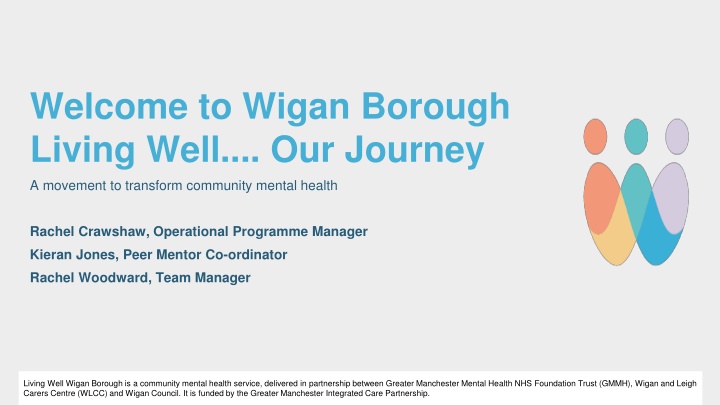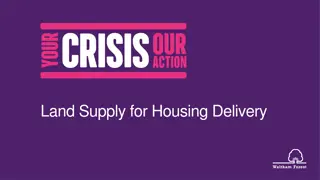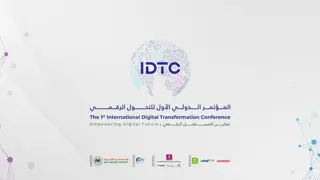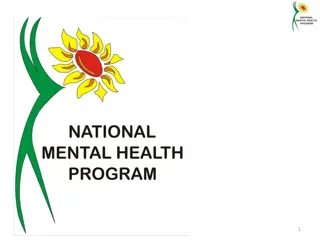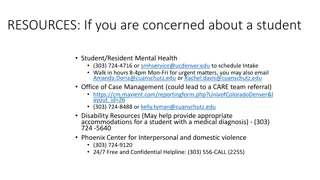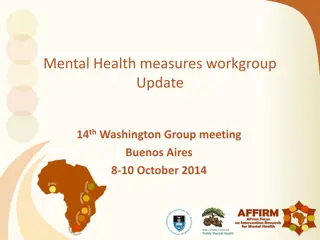Transformation of Community Mental Health Services in Wigan Borough
Living Well in Wigan Borough is a community mental health service aiming to transform mental health care by focusing on a place-based approach and integrating services for better outcomes. The initiative addresses issues such as fragmentation in care, access barriers, and delays in receiving appropriate high-quality care. By adopting a more streamlined and integrated model, the program seeks to improve transitions between services and reduce waiting times for mental health support.
Download Presentation

Please find below an Image/Link to download the presentation.
The content on the website is provided AS IS for your information and personal use only. It may not be sold, licensed, or shared on other websites without obtaining consent from the author.If you encounter any issues during the download, it is possible that the publisher has removed the file from their server.
You are allowed to download the files provided on this website for personal or commercial use, subject to the condition that they are used lawfully. All files are the property of their respective owners.
The content on the website is provided AS IS for your information and personal use only. It may not be sold, licensed, or shared on other websites without obtaining consent from the author.
E N D
Presentation Transcript
Welcome to Wigan Borough Living Well.... Our Journey A movement to transform community mental health Rachel Crawshaw, Operational Programme Manager Kieran Jones, Peer Mentor Co-ordinator Rachel Woodward, Team Manager Living Well Wigan Borough is a community mental health service, delivered in partnership between Greater Manchester Mental Health NHS Foundation Trust (GMMH), Wigan and Leigh Carers Centre (WLCC) and Wigan Council. It is funded by the Greater Manchester Integrated Care Partnership.
Background to Transformation Rachel C Community Mental Health Framework for Adults and Older Adults by NHSE/I and the National Collaborating Centre for Mental Health (2019). Work undertaken by GMHSC, supported by the Innovation Unit, has been summarised in a GM prospectus published in February 2021. The GM model was developed with the support of the Innovation Unit and formed a key component of the bid submission made in January 2021 which led to the unlocking of the first tranche of funding. Services will be organised around a place-based approach linked to PCNs (population 30,000 to 50,000) with specialist services over a wider area (population 250,000 to 500,000) supporting local teams. The GM proposal amounts to a planned spend of 43,625,000 over the three-year period from 2021 to 2024 NHSE/I has recently confirmed that CPA in its current form is being disestablished to enable the development of simpler approaches to care planning and delivery. Living Well - https://www.livingwellsystems.uk/about
The Case for Change Rachel C Distance from community Fragmentation and moving between services. Thresholds and other barriers to access Difficulties in getting appropriate high quality care Recent focus had been on specialist teams the creation of these separate specialist teams has, in most places, led to fragmentation and discontinuity of care. When multiple services provide care, multiple assessments can be common. This is distressing for the person, increases the chance of drop out, delays treatment and is poor use of resources. Recent focus had been on specialist teams the creation of these separate specialist teams has, in most places, led to fragmentation and discontinuity of care. Recent focus had been on specialist teams the creation of these separate specialist teams has, in most places, led to fragmentation and discontinuity of care. When people s care moves between teams, typically over 20% of them do not reach the new team. People with legitimate care needs are excluded from mental health teams as they do not fit rigid service specifications or meet often arbitrary thresholds. When people s care moves between teams, typically over 20% of them do not reach the new team. When people s care moves between teams, typically over 20% of them do not reach the new team. Transitions are a particular issue for young people moving into adult mental health services and people moving from general adult services to those for older people. Transitions are a particular issue for young people moving into adult mental health services and people moving from general adult services to those for older people. Across the system, some waiting times are increasing. Transitions are a particular issue for young people moving into adult mental health services and people moving from general adult services to those for older people. There are long waiting lists for psychological therapies from many secondary care providers.
Potential Benefits & Improvements Rachel C Less bureaucracy move away from CPA, simpler processes and forms A simpler system fewer assessments, more focus on connecting services users with effective interventions in a timely fashion. Availability of wider range of support and interventions through closer working with VCFSE partners. More team working less burden on individual practitioners. Better integration enabling easier connections between service users and interventions. Improved relationships with GPs. Increased service user satisfaction in response to more personalised care. Early intervention should reduce crisis presentations and hospital admissions.
Greater Manchester workstreams as part of community transformation Rachel C Core Living Well offer including PCN work Personality disorder CERN pathway Community adult eating disorders Early intervention in psychosis (EIT) Physical health and SMI MIND Community Engagement Project IPS (individual placement and support) focussing on employment and education Community mental health rehab IAPT Talking Therapy for Anxiety & Depression Adult social care Enabling workstreams - Psychology, digital, workforce, VCFSE Secondary care MH services redesign specialist team .
The vision Rachel C Our principles for community mental health Person Centred Outcomes People are our focus, neighbourhood is the lens. Nothing about us without us . People are equal partners in their own care. Promoting choice, recovery and citizenship. We are mobilising supportive communities connecting people, carers, and peers. People can share their story, knowing it will be properly listened to and valued; safely recorded; and help offered. Our approach is strengths based, trauma informed, solutions focussed. Building up and on peoples strengths. We are constantly collaborating, learning and improving. Having permission to test & learn together. Our response is evidence based and holistic combining the best from the NHS, social care and voluntary sector. We are bridging the gap between primary and secondary care.
Who Will the Living Well Service Help? Rachel C People aged 18+ who are registered with a GP in the Wigan Borough. The service will work with older adults (65+) with functional mental health issues only. The service will not work with older adults with organic mental health issues. People with complex mental health issues who might be deemed too complex for primary care services but not complex enough for secondary care mental health services. These people may also have additional needs including safeguarding, social, housing, financial, addictions etc. The service will aim to work with people for a maximum of 12 weeks. The service will not provide care co-ordination. The Living Well Service will not provide psychological therapy however will provide psychological assessment/formulation and support people to access relevant services e.g., IAPT or secondary care.
The Voice of Lived Experience Kieran Putting the Voice of Lived Experience at the Centre of Services & The System ROSE I m told I m too poorly for Mind and I had CBT a while back and was told I was too ill for them ( ) but I m not poorly enough for other stuff; How poorly have I got to be?
Wigan Borough Living Well Design Group Kieran Formed 22nd March 2022 and met weekly for 2 hours till July 2022 when this reduced to fortnightly. We have completed 25 sessions including workshops from the Innovation Unit. We have had attendance from between 12-25 people at each session. We have had membership and valued contributions from the following experts by experience, carer/family organizations, VCFSE organizations, ICB, emergency services, providers of mental health services, local authority services, primary care services, public health, linguistic services, children/family services and equality & diversity leads. We have worked together in a respectful way to Collect stories from people with lived experience, their carers/family members and professionals Design & agree the service model & submit the investment application (June 2022) Gather & analyze data to identify and confirm the prototyping area (Hindley) Scope local areas to identify estates to house the team Map out existing VCSFE services through neighbourhood workshops Develop the service handbook including thinking about the person s journey through the service Develop service values and guiding principles
Ideal Model Whole Borough V6 June 2022 Community VCSE Services Community MH Services Spoke Wigan North (7.0wte) Paid Peer Mentor Volunteer Peer Mentor Network Support Worker(VCSE) Mental Health Link Worker ARRS Roles MHP, TAPP Additional ARRS Role (23/24) Spoke TABA (7.0wte) Paid Peer Mentor Volunteer Peer Mentor Network Support Worker (VCSE) Mental Health Link Worker ARRS Roles MHP, TAPP Additional ARRS Role (23/24) Spoke Wigan Central (7.0wte) Paid Peer Mentor Volunteer Peer Mentor Network Support Worker (VCSE) Mental Health Link Worker ARRS Roles MHP, TAPP Additional ARRS Role (23/24) HUB TEAM Ops Manager Team Manager Clinical Lead/Psychologist Peer Mentor Co-Ordinator Senior Administrator Administrators x 2 Psychiatrist (0.6wte) Pharmacist Psychologist/Therapist MH Nurses NMP x 2 Social Workers x 2 OT x 2 Spoke LEIGH (7.0wte) Paid Peer Mentor Volunteer Peer Mentor Network Support Worker (VCSE) Mental Health Link Worker ARRS Roles MHP, TAPP Additional ARRS Role (23/24) Spoke - Hindley (7.0wte) Paid Peer Mentor Volunteer Peer Mentor Network Support Worker (VCSE) Mental Health Link Worker ARRS Roles MHP, TAPP Additional ARRS Role (23/24) Spoke LIGA (7.0wte) Paid Peer Mentor Volunteer Peer Mentor Network Support Worker (VCSE) Mental Health Link Worker ARRS Roles MHP, TAPP Additional ARRS Role (23/24) Spoke SWAN (7.0wte) Paid Peer Mentor Volunteer Peer Mentor Network Support Worker (VCSE) Mental Health Link Worker ARRS Roles MHP, TAPP Additional ARRS Role (23/24) Additional VCSE Posts (10%) on top of this model. Community Primary Care Services Community LA Services
Community VCSE Services Community MH Services Prototyping Team Hindley PCN December 2022 HUB TEAM Operational Manager Clinical Lead/Psychologist Clinical Team Manager Psychiatrist Clinical Pharmacist Social Worker x 1 Occupational Therapist x 1 Peer Mentor Co-Ordinator Mental Health Link Worker Senior Administrator Spoke Team HINDLEY Paid Peer Mentor Volunteer Peer Mentor Network Support Worker (VCSE) Mental Health Practitioner Trainee Associate Psychological Practitioner Mental Health Link Worker Community Primary Care Services Community LA Services
Spoke Team Primary Care Networks Rachel W Mental Health Spoke Teams are now active across the PCN s. The team consists of a Mental Health Practitioner, Trainee Associate Psychological Practitioner and Mental Health Link Worker. The team are based in GP surgeries and document on GP clinical systems. The MHP and TAPP roles are part of the ARRS contract which means GMMH fund 50% of the salary and GP funds the other 50% of the salary. GMMH hold all HR responsibilities. The Mental Health Link Workers are fully funded by GMMH and although currently working in GP practices are likely to be based in the Living Well spoke teams once operational. Each MHP covers between 8-13 practices, so capacity is limited and there is no ability to work with people who present with risk to self/others. MHP s offer assessment then up to three follow up sessions. All will be non-medical prescribers by August 2023. Trainee Associate Psychological Practitioners offer time limited brief psychosocial interventions (maximum 6-8 sessions). Mental Health Link Workers support people to access community services for a time limited period (maximum 6 sessions). The spoke team will not have to refer into Living Well however will be expected to attend allocation meetings to discuss possible people who may benefit from using the Living Well service.
Additional Roles Reimbursement Scheme (ARRS) Rachel W As part of the NHS Long Term Plan, localities are being asked to realign community mental health services with Primary Care Networks (PCNs), creating new and integrated models of primary and community mental health care by 2023/24. To support these integrated models, Mental Health Practitioner (MHP) roles have been included in the GP Contract Additional Roles Reimbursement Scheme (ARRS) from April 2021. On 21st January 2021, NHS England/NHS Improvement issued further guidance on the GP Contract describing the support for GPs in 2021/22 and beyond. Included in the guidance was confirmation of the arrangements going forward for PCNs and community mental health services, namely: A joint funding model will bring together additional community mental health service funding with PCN funding.
PCN Mental Health Team Role Outlines Rachel W Common MH Problems declined or rejected by IAPT due to complexity/risk. Diagnosed SMI but not in receipt of secondary care MH services. Review of recently prescribed MH medication. Other mental health need not served by existing services. Refer/Allocate to PCN Mental Health Team Mental Health Practitioner The MHP may offer an initial conversation or signpost to another person/service. This could include the assistant psychologist, mental health link worker, other mental health service or VCSE. If appropriate they will offer an initial conversation/assessment which includes history of presenting problems/presenting problems, risk assessment, current social/occupational situation, relationships, and goals. A person may be offered up to three follow up sessions with the MHP. Follow up sessions may include safety/shared care planning, brief psychoeducation, or medication management/review by a non-medical prescriber. Assistant Psychologist Mental Health Link Worker Help people to access/engage with community/VCSE services. This may involve supporting people to attend groups, services, or appointments. Provide self-help information. Establish routines, promote self-care, and build confidence. Achieve secondary goals in addition to those identified to improve their mental health and wellbeing. E.g., employment, housing, education, and finances. Connect to other relevant wellbeing services e.g., health promotion, smoking cessation, weight management, be well services. Provide brief psychological interventions on an individual/group basis. The interventions can be locally determined but may include Crisis Toolbox (grounding techniques), CBT informed interventions, DBT coping skills (emotional regulation, mindfulness, interpersonal effectiveness), Psychoeducation/brief interventions - sleep hygiene, problem solving, worry management, mental health promotion, relapse prevention & Motivational Interviewing.
Thank You For Listening Any Questions?
